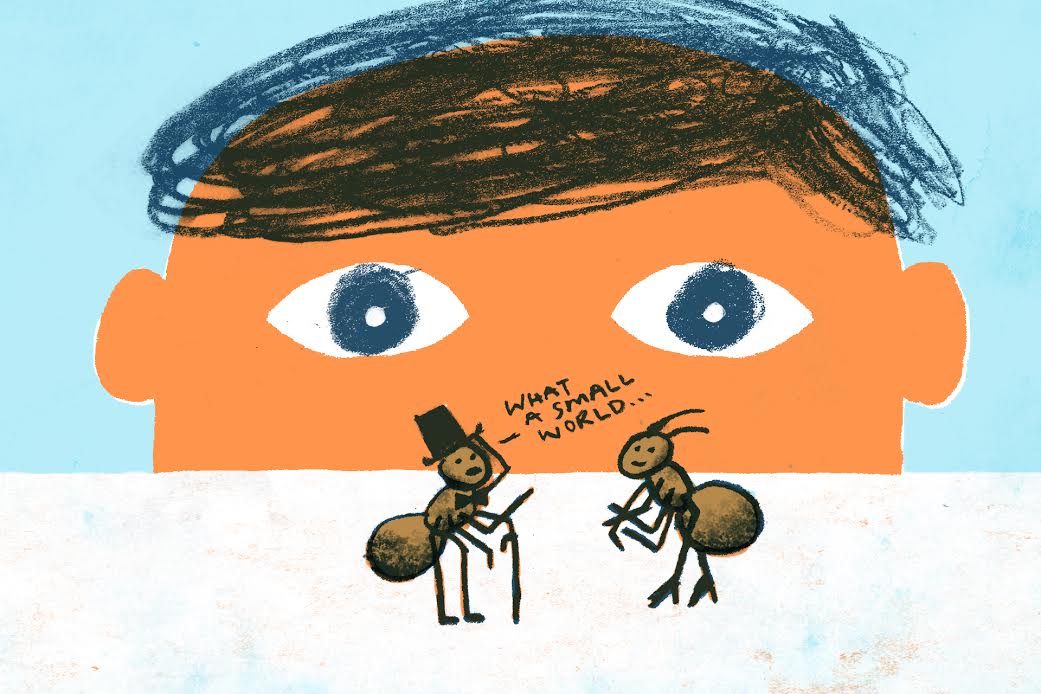Illustration by nuglybird for Rice
Read Part 1: In Defense of Small Talk
Ever since part one of this series was published, I have been inundated with speaking requests, invitations to teach experimental classes in liberal arts colleges, and asked to contribute to so many click-bait-only web publications all over the world that I had to turn down Yahoo and one of the Huffington Post blogs I don’t recognize. That is my personal benchmark for success.
Writing and publishing is like screaming into a bottomless chasm where you throw yourself out there but hear nothing back. I really should arrange for 20 or 30 people to read the article in front of me while I examine their facial expressions.
There were some web analytic figures given to me by the guys from Rice, which in this world of number inflation where my friend’s dog has a few hundred followers on Instagram, the hits on my first piece sounded pretty underwhelming. No one claps, no one buys tickets, but anyone can share the article with their friends. No hits? No excuse. Obviously, I’m still far from rejecting Huffpost’s So That Happened—yeah, that one sub-blog deeply embedded in their award-winning site.
I wrote part one with scant idea of how I was going to write part two and I am now kicking myself for committing to a two-part series. Over the past weeks, I’ve met up with a few friends who read the first piece. 80 percent of them left it as that—that they had read it. No further comment. I was so conscious of the descending gulf of silence that I changed topic immediately. I wasn’t going to be that guy that directly asks, “so what did you think?” because I don’t want to put people on the spot. They have no obligation to read my work carefully, nor owe me the effort of crafting out a measured response to a sensitive and easily-offended conversation partner and writer.
I guess my point is that small talk functions much the same way. You need to just launch into it and have faith that a more substantial connection may follow if the universe so deigns it appropriate. Start with “talking about the talking” if need be. The idea is to keep at it till you get more comfortable and get into the groove of conversation.
You really don’t want to be at that wedding, standing in the foyer with a glass of Fanta Orange you regret taking from that pimply and overly-gelled waiter while waiting for the dining hall doors to open, because you fear meeting up with an acquaintance you hit on once while drunk in a club, or that relative you haven’t visited two Chinese New Years straight.
The best way to get over the jitters when you finally run into them is to focus purely on the act of talking, and not worry about content. The priority is to stay relaxed, watch your breath, and just push words out of your mouth. At this point of interaction, your body language and energy-levels affects the conversation more than the words. So, just keep talking. Always remember that they could be just as uncomfortable as you are.
Discuss the fact that you are meeting again, or recount how long it has been—basically, go meta. Complain about the number of weddings you’ve been to in the past year. That always gets a decent conversation going.
Focus on the moment: talk about the parking, about how it’s really crowded, or about how you haven’t been back to this hotel in a long time. Say anything that comes to mind based on your physical presence—about the food, décor, or the gaudy carpet.
Compliment someone on what they are wearing, or on an interesting accessory that you know they wore for attention. If someone you are meeting is wearing a fascinator it is almost outright rude not to address it.
Embracing small talk requires a shift in mind set. When you are mentally prepared to rely on go to lines—whether it’s stating the obvious or commenting on the environment around you—and acknowledge that it’s really ok to engage in small talk, you immediately reduce your fear of entering a wedding venue, bar, or conference hall. That does not make you a shallow person, just someone who has learned to cope. And trust me, the confidence will show.
I used to fear running into people I knew along the streets or in restaurants, but once I got over the necessity to engage in “proper” conversation and adopted the “talk for talking sake” construct of asking obvious questions like “going to lunch?”, “coffee break, ah?”, or “wah, damn hot hor here,” life became that much more manageable. Watch the social mavens in your group—that is exactly what they do all the time. A favourite one is “so what are you drinking?”.
That being said, there is no need to go all stream of consciousness and spout nonsense to whoever you meet. Please stay conscious and use your brain. Good small talk requires paying attention to what people have to say, and exercising some creativity in return.
For example, when asking about how a mutual friend is doing, some blurt out, “oh, small world, small world,” which is likely a line from their collection of knee-jerk stock responses. Avoid relying on buzz phrases like the increasingly popular, “Singapore is so expensive nowadays,” which I have heard being thrown about at all junctures of different conversations. And why is everyone always missing New York again?
The nervous few instinctively repeat what you say, verbatim. I say “it’s so noisy here”, and they repeat “so noisy here” immediately after. It is always strange to hear, and even more surprising to notice. Calm down, listen, and be present.
I suspect the nervousness stems from the notion that there is a textbook way to do small talk, and hence people stop thinking and go into “small talk mode”. It was as if small talk was one part of a five-day course attended by an entering class of elite government scholars on how to interact with fellow human beings. I remember an etiquette class in the army where we were taught to say “how do you do?” when introduced to a fellow cadet’s female friend on “social night”. Forget all that because it’s time we had some fun with small talk.
Don’t open with “what’s new” or “what have you been busy with?”. Think about it—its really too general a question to be able to answer truthfully, and acts more as an invitation for more boring stock responses. It’s also unethical to place the burden of the rest of the conversation on the other party. What? Now they have to describe their whole mood and life situation to you? Unless, of course, you are doing it like an American, and treat it more as a greeting and are not expecting an answer.
These are all small talk clichés that are to be avoided. The moment clichés are used, it becomes too obvious that either side is putting in effort to make conversation, and every one clams up and wants to run away. Small talk clichés include responding to how-are-yous with “busy busy, you know, the usual,” and countering with, “ah, busy is good!” Don’t do that, please. Refrain from asking your conversation partner if he or she is travelling anytime soon.
Be creative with small talk. At work events, talk about the canapés and compare it to another conference you’ve been to. Speculate about the budget for the food per person. Find a speaker from the conference both of you disliked—nothing brings people together faster than a mutual dislike for a third party. At happy hour gatherings, discuss where else has cheaper or stronger drinks.
Take your time. After the first few exchanges, learn to embrace small moments of silence just so you know that the other party is putting in the same amount of effort—a conversation requires a balance of payments to survive. Small talk need not be witty repartee, so give each other some breathing space.
If you didn’t hear what people say, it is ok to ask, and don’t feel that you need to mask it all the time with laughter or saying, “yah yah yah.” If it’s in a nightclub, ask once, then give up quickly before you get spit all over your ear. If you didn’t catch a joke don’t pretend you did, and do ask for clarification. Because people can tell if you are merely humouring them, and more importantly, asking for an explanation discourages bad joke-making.
Look, small talk does take effort. But this effort of concentration and thinking helps you avoid the alternative of hating yourself for turning up at any given social function and suffering through the discomfort of being there. Be good at small talk and you’d dread people much less.
There are times when you are enjoying talking to someone, but they are quiet and you wonder if they want to leave. Don’t overstay your welcome. Involve other people into the conversation with random statements like, “I was just telling her that I’m allergic to shiitake mushrooms.” Whatever, just find a way to get someone else talking. Or excuse yourself to get a drink or go to the bathroom and leave your boring conversation partner alone to find their own coping devices. It’s ok to do that: like euthanasia, it’s kind to both of you.
Perhaps it’s time. In the event that you are writing or speaking to an anonymous audience, there are no “others” to rope in, no cues to know when you are not wanted, and no bathroom to escape to. In this case, you are now Legend from that Will Smith movie, and have found yourself in an empty world making small talk to nobody. Just quieten down, drop your head, turn around, and walk away.
Years on and I still hold on to the hope for the rare chance that small talk transitions into a real friendship. I am trying and all I can do is to keep writing, and wish for someone to find out and refer to my essays as “content” one day.






